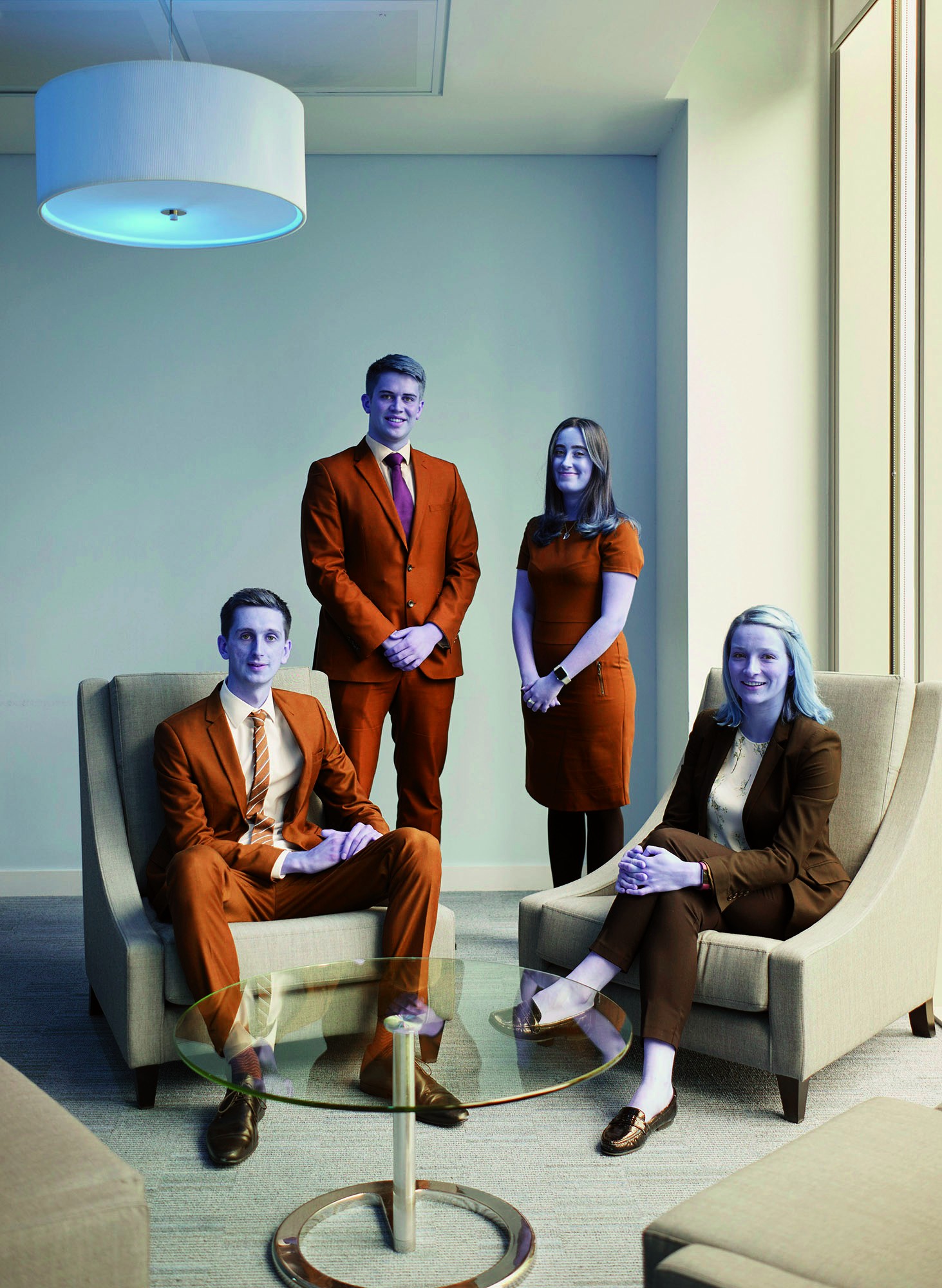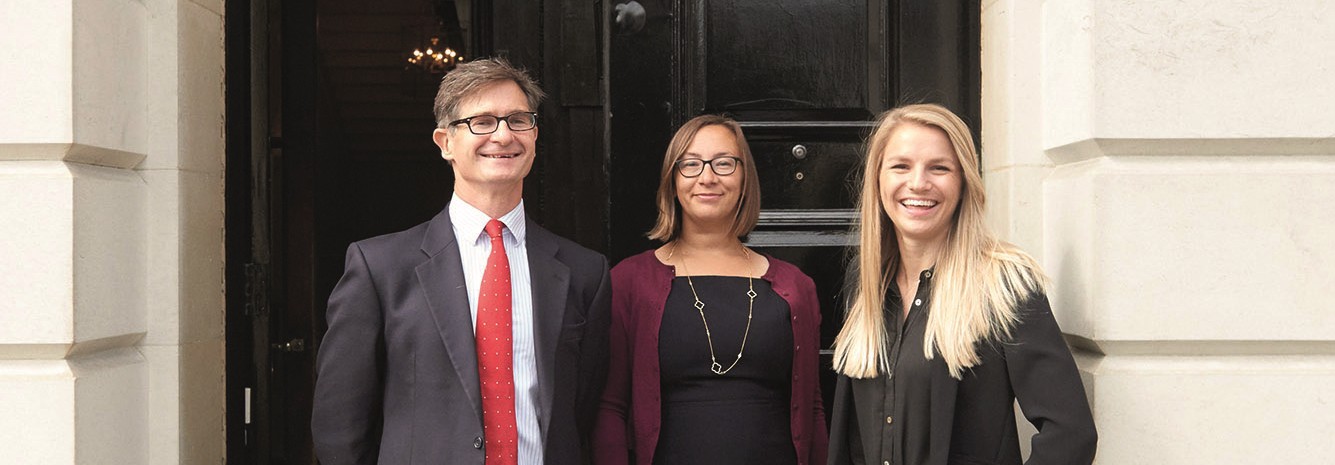Commendation for Diversity
Baker McKenzie

This firm has demonstrated a strong and consistent commitment to increasing diversity and to building an inclusive culture.
It is a truth universally acknowledged within the legal profession that Baker McKenzie is an early adopter – and proud proponent – of all things diversity and inclusion (D&I). It is thus little surprise that the firm is this year’s recipient of LawCareers.Net’s Commendation for Diversity, the only firm to have been awarded it twice.
The path was set from the very beginning – in post-war Chicago Messrs Baker and McKenzie founded their firm with the aim of making it truly international, and throughout its history Baker McKenzie has always looked outwards. It’s no surprise then that the firm lives and breathes the tenets of D&I. This is backed up by numerous accolades, including many relating specifically to the London office’s recruitment and training processes. In 2007 it became one of the first organisations in the United Kingdom to adopt a name-blind CV process, while in 2015, it became one of the first two employers in any UK industry to publicly commit to using Rare Recruitment’s Contextual Recruitment System (CRS, more on which later). In May 2017 Global Chair Paul Rawlinson voiced Baker McKenzie’s full support for gender pay parity – this was swiftly proved to be more than mere good intentions in June, when the firm was ranked 11th in the government’s Social Mobility Employers index.
At Baker McKenzie, diversity is not just about doing the right thing, it is a core strategic focus and seen as critical to the firm’s success
The firm’s affinity groups are wide ranging – from those common to many top-tier law firms, such as Women, Ethnicity, Opportunity (ie, social mobility), Wellbeing (including mental health) and LGBT, to an extensive LGBT Allies network, which over a third of the London office has joined; its objective being to support LGBT colleagues and to create an environment where people feel able to be themselves. Similarly impressive is the list of graduate D&I organisations which the firm partners with, including, but not limited to: Aspiring Solicitors, the BLD Foundation, Career Ready, City Solicitors Horizons, DiversCity, MyPlus Students’ Club, PRIME and Rare.
Central to these efforts is a crack team of D&I flag bearers from the graduate recruitment and inclusion & diversity teams. Trainee Ellie Austin-Williams has nothing but praise for the team: “I don’t think the firm would be where it is today without them. They are so passionate about what they do and it is infectious. People want to be involved because of them. There is always going to be a lot more to do on diversity, but the firm has made a lot of progress and genuinely does what it says – we really do walk the walk.”

Baker McKenzie’s credentials are there for all to see. In fact, that visibility is one of the things that often prompts would-be trainees to apply. Jonathan Tham, now a first-seat trainee in corporate M&A, agrees. “I am Chinese and was born abroad,” he explains. “What attracted me to Bakers was that I could see people like me in senior positions. I felt that there wouldn’t be a ceiling and that I could go as far as I wanted to.” His time on the firm’s spring vacation scheme confirmed this impression. “During the scheme we had a talk on D&I and a separate one on CSR. It showed how much emphasis and value was placed on both, but also that they are considered distinct from one another. At Baker McKenzie, diversity is not just about doing the right thing, it is a core strategic focus and seen as critical to the firm’s success.”
Chloe Quirk, an employment associate, describes how Baker McKenzie has ramped up its approach to encouraging vacation scheme students to become involved with D&I initiatives. “When I was on the vacation scheme in 2010, we were told about the various diversity initiatives and we were welcomed to get involved,” she recalls. “But now it’s even more so – students are invited to events, encouraged to voice their ideas, and stay involved beyond the scheme.” Sam Manful, a banking associate who joined Baker McKenzie as a lateral hire from a magic circle firm agrees: “Just last week, we had vac scheme students helping at our social mobility event – they were told that even though they’re here temporarily, if they’re interested in what we’re doing, they should stay in touch and remain involved.”
This brings us neatly on to one of the firm’s most recent D&I events. Planned and executed by Chloe and Sam, it is a shining example of how people are encouraged to take an initiative and run with it. Chloe explains its genesis: “Having joined several D&I initiatives as a trainee, I started to take a more active role in firm’s social mobility network, joining the sub-committee of the ‘Back to School’ project. The scheme encourages staff to use their annual volunteer day to visit their former school, especially if it’s a state school in a social mobility cold spot, to tell their story and to give an insight into what it is like to work in a City law firm. Inspired by ‘Back to School’, Sam and I reached out to our old sixth form college in Essex, and organised an open afternoon for around 50 sixth form students. The students attended a range of skills sessions including a negotiation workshop and panel discussion, and had the opportunity to meet lots of people from the firm.”
Sam continues: “When I discussed the viability of an open day for our college, there was a refreshing amount of support from the firm; it is very aware of its wider responsibilities and it does a lot to allow all members of staff to make a difference. The event took a lot of planning and hard work – we started in September and it culminated in January, and was a huge success. The level of engagement from the firm was great – not just from our inclusion & diversity team, but from within my own department, including people who hadn’t engaged with any social mobility events before.”
Our objective is the same – it’s about inclusion, acceptance and being comfortable bringing your whole self to work
“It was great to meet the students and to give them an opportunity to visit the office. I had previously returned to my sixth form college as part of the ‘Back to School’ initiative, but I wanted to go one stage further,” Chloe adds. “As part of the afternoon, the students were surprised to learn that Sam and I had attended their college and we had been in their position. If we helped to raise awareness of this profession for just one student in the room, then we’ve done our job.”
Arron Slocombe, pensions partner and one of the firm’s social mobility champions, reflects on the importance of giving everyone in the firm the chance to get involved with D&I, along with the licence to come up with new ideas. “Our focus groups meet regularly and they’re not just talking shops – we want new ideas, from everyone,” he enthuses. “If you give people a sense of ownership over an initiative, it goes beyond just being a policy – it lifts it off the page, you could say. Also, people are more likely to create something that they are personally committed to with that level of autonomy.”
Ellie also suggested a new schools programme recently and was given the freedom to run with it. “Along with two other trainees, I am working on a social mobility initiative with one specific school in a deprived part of East London, but with a view to rolling it out to other schools,” she explains “We are running an essay competition – we’ve had great engagement from the students and invited the winners into the firm for lunch with some of our partners. As it’s a project I’ve helped to own and shape, I feel much more invested in it.”
Jonathan too has had the chance to be a part of two D&I campaigns that are close to his heart. “I am involved in two forthcoming campaigns focusing on anti-bullying and the concept of ‘Colour brave’,” he explains. “Colour brave aims to break through the discomfort people can feel when talking about race. We will be encouraging the entire office to develop the tools to feel comfortable speaking openly about ethnicity. There is a common thread between the two and we’re trying to bridge that gap. It makes sense to bring our diversity groups together wherever there is crossover. Regardless of diversity strand, our objective is the same – it’s about inclusion, acceptance and being comfortable bringing your whole self to work.”
That intersectionality between groups is something that Arron recognises as important. “We try hard to link up the groups, working holistically, and pooling ideas and resources. There’s no point viewing them in silos – for example, social mobility often overlaps with ethnicity in terms of personal background, so it’s important to recognise that. It’s also a good way to get people speaking and the more that happens, the better.”

Another way to encourage open conversations is to get people to tell their own stories. “Over the last couple of years we have created a platform for different groups of people to share their personal experiences on, for example, mental health issues or social mobility,” explains Arron. “It really gets people talking to each other and then engagement with the initiatives goes up; it’s something of a virtuous circle. It is a very powerful way to help people to be themselves. Ultimately, that shows a genuine commitment to D&I, and it has lots of benefits for the firm.”
In fact, there are many direct benefits for a law firm known to have a diverse workforce. “The more that people can truly be themselves at work, whatever their background or affinities, the more they will enjoy their jobs,” surmises Arron. His feeling is that it also improves client relations: “Clients are increasingly looking for their legal teams to reflect their own diversity. Partnering with clients on joint initiatives – for example on work placements or school-focused social mobility programmes – is a natural way to go beyond the day-to-day discharge of legal work and form more meaningful relationships.”
Firm-wide commitment is a cornerstone for the success of these multitudinous initiatives. Each focus group has two partner sponsors and there is active leadership from the firm’s management committee; it is right at the heart of the entire firm’s strategy, with a designated partner whose sole job is D&I. “You have to make sure that you apply it to the entire office and engage with everyone,” Arron confirms. “We also set goals for each group and monitor those goals; you’ve got to know where you’re heading to see what works and what needs tweaking.”
Arron touches on the importance of Rare’s CRS within the recruitment space: “The system helps to highlight candidates who are from less privileged socioeconomic backgrounds and gives us the ability to make hiring decisions in context. For instance, the CRS highlights if a student has attended a poor-performing school and we are able to view academic credentials through an entirely new lens. During the last year, we have made training contract offers to people who, before using the CRS, would not have made it past the first stage in our process.”
The emphasis on D&I feeds into a broader culture which is welcoming and warm. “When you join, you feel instantly as if you’re part of a family that cares about how you develop as a person and as a professional,” enthuses Chloe. “It is honestly such a lovely place to work.” Sam agrees: “As I am in a position of being able to compare firms, the culture here is markedly different. You feel part of a wider family, you don’t get that everywhere. This applies across the entire firm – not just to lawyers, but Business Services and PAs everyone is made to feel valued.”
Ellie muses on her experiences as a trainee so far: “Talking to friends at other firms, I frequently feel very lucky to be here! I’ve had two female supervisors, both of whom were amazing lawyers, working mums and very well respected. There is a very open and approachable culture.”
Jonathan sums things up: “My expectations were very high when I joined – the firm had a reputation for being one of the best in the world, with a strong commitment to D&I. I’ve definitely had that confirmed.”

Commendation for Diversity
This firm has demonstrated a strong and consistent commitment to increasing diversity and to building an inclusive culture.
Best Training Principal – Small trainee intake
Forbes Solicitors
This person is an exceptional training principal and mentor, and is demonstrably committed, enthusiastic about and invested in the firm’s training programme and trainees. They are extremely approachable; if you have any type of query or difficulty, it will be taken seriously.

Best Training Principal – Small trainee intake
Best Training Principal – Large trainee intake
Withers LLP
This person is a natural teacher and inspiring mentor, as well as being incredibly committed and approachable. You can go to them with anything from technical questions or concerns about training, to creative ideas about different ways that trainees can get involved with business development.

Best Training Principal – Large trainee intake
Best Work Placement Scheme – Regional Firm
DWF LLP

The vacation scheme was an extremely valuable insight into life at the firm.
While DWF started life in 1977 as Davies Wallis & Co in Liverpool, a period of organic expansion means that it is now operating out of 23 locations around the world, with over 2,700 people. This is a legal business that knows something about carefully managed growth and the recruitment of its UK trainees is very much a part of that strategy. At the core of the recruitment drive is DWF’s award-winning vacation scheme. Carl Graham, insurance partner and training principal, describes why it plays such a pivotal role: “While reading and researching a firm is important, on the scheme you get a true feel for the personality of the place and the people that you can imagine yourself starting your career with. It offers real insight into the personalities here and the fact that we genuinely don’t take ourselves too seriously – we are not a stuffy firm. That can be difficult to convey unless you are sitting with the lawyers and seeing how they interact with each other and clients. So the scheme is absolutely crucial to finding the right people for the firm.”
First, though, you’ve got to get the right people interested. Hannah Turner, now a second-year trainee, expands on what first caught her eye: “When I was studying at The University of Law, I attended a presentation by DWF and it really stood out from the others I’d seen. The growth of the firm was exciting and the graduate recruitment representative was clearly passionate about working there. He offered some very useful and practical tips for making applications, which were directly applicable to my situation. Also, I thought that I would be a good fit based on the type of candidate he described. It all helped to spark my interest.”
We’re looking for people who demonstrate enthusiasm and engagement, not just in terms of the work
She went on to take part in the Summer 2014 two-week vacation scheme, spending time in each of the real estate and construction, banking and business restructuring, and wills and probate departments. “I attended client meetings, including having the opportunity to discuss changes to a will and have a first attempt at drafting amendments,” she recalls. “With each task I was given, someone always took the time to go through it and explain it to me – that was invaluable in terms of getting a true understanding of what was being asked of me.”
Work placement schemes, no matter how thorough, don’t win awards without including some high-calibre social activities and DWF’s is no exception. Hannah was invited to join in a jam-packed itinerary that included rock climbing, pizza making, going out for drinks, and ‘Friday Fridge’, which occurs on the last Friday of every month and is a chance for the entire office to hear about what’s been happening that month and informally spend time together.
Everyone involved with the scheme agrees about the single most important thing a candidate can do to get the most out of it – namely, engage with the process. James Szerdy, banking partner and graduate recruitment partner, emphasises the importance of being keen: “We’re looking for people who demonstrate enthusiasm and engagement, not just in terms of the work – we appreciate that it is early in their understanding and development – but also in engaging with all aspects of the business. We obviously also keep an eye on their work productivity, but it’s not the be all and end all.”

Charis McGowan, DWF’s emerging talent coordinator, agrees and adds: “The most important thing is for the students to get as involved with as many different things as they can. On our most recent scheme, some students were offered the chance to go to court and to client meetings. They need to grab those opportunities with both hands. Those who do will be the most successful in the process. Obviously we also want them to try their best with the work that they’re asked to do; we don’t expect the right answer every time, but if they can show that they’re keen to get involved and they try, that will help them to grow.” Finally, Carl has this to add: “You are joining a busy team, so make sure that they know you’re there and that you’re adding value. It’s about getting to know the business and the people around you. Talk to them about what is involved, how things fit into the bigger picture, and show interest in why you’re being asked to do something; that is what will impress and be remembered for the right reasons.”
Hannah uses her own personal experience to back up this advice. “I tried to get involved with it all, including playing netball with the firm,” she laughs. “I spent time getting to know the trainees and trying to learn more about their experiences of the training contract. Show enthusiasm and ask questions – everyone here is very receptive to that.”
We try to immerse the students in the business; including giving them access to people at all levels
It is little surprise that such participation is a two-way street: encouragement and support are central to the overall approach DWF takes to looking after its summer students. “Each student is given a supervisor and buddy, but the entire department is there to welcome them in, give them work or just to go out for a coffee with,” explains Charis. “Candidates are encouraged to approach partners throughout the scheme – being open plan helps with that, as there are no intimidating doors to knock on. The students quickly build up their confidence that way.” James adds: “We tend to assign junior solicitors to buddy up with our vac schemers day to day, as they have most recently been through the recruitment process themselves.”
Participation and buy-in from the entire firm are defining features of the process, so although students’ first stop may be their almost-contemporaries, more senior lawyers are also very much part of the process. “We try to immerse the students in the business; including giving them access to people at all levels. And we have no trouble getting partners to help with the scheme, for example, the students are assigned a task to prepare a mock pitch to a panel of partners playing the role of the board of a major client,” describes James. “There are also social events that include a partner dinner, which gives students the chance to chat to partners informally about what it’s like to build a legal career and life at DWF.”

Charis concurs: “There is very strong investment in our trainee recruitment from the senior partners, which I think sets us apart from our peers. James and Carl are involved throughout, as are many other partners, including our CEO and managing partner, Andrew Leaitherland. I think that shows real commitment to the process. We are all determined to get the best candidates possible, and to do that, they need to meet a wide range of people from within the business, which helps to inform their decision about whether they can imagine working here.” Hannah adds: “We had presentations from partner heads of the sector groups, which brought home how happy they were to take time out of their busy schedules to talk about their roles within the business. Overall, we had great exposure to senior people.”
This refreshing lack of a strict hierarchy continues into life as a trainee, as Hannah reports: “This is not a hierarchical organisation and everyone is treated with equal respect regardless of seniority; I have worked very closely with partners, including taking responsibility for some of their files and helping to run deals. Also, as we’re open plan, I sat next to partners in two of my seats, which allowed me to see how they interact with clients every day.” James confirms this impression: “We are a relatively young firm, which is dynamic and inclusive. Everyone within the business is approachable and contactable; there is no hierarchy as such, and I think that the recruitment process reflects that. We certainly hear that from candidates when compared to other firms’ processes.”
This dynamism is also reflected in the type of work that trainees can look forward to, from a fairly early stage. “Straightaway, we get trainees doing work of a level that a second-year trainee or NQ would expect. Our lateral hires tell us that our trainees do high-level, interesting work that trainees at other firms don’t,” explains Carl. “There will of course be times where the tasks are more mundane, but they’re still contributing in a valuable way.”
Hannah adds: “The level of experience and responsibility depends on the department, but I’ve been very busy in all my seats and have had the chance to get stuck in early on. Being a trainee here allows for true ownership. If you show willing you have the opportunity to get involved with big transactions from day one, managing files, running conference calls, and putting forward ideas and suggestions, all closely supervised of course. I certainly haven’t spent the last year standing next to the photocopier.”
Charis summarises where the vacation scheme sits within the overall recruitment picture and why it’s so important: “We want to give candidates the opportunity to see what makes us different and experience the culture for themselves. We run workshops, allow them to experience live legal matters, and give exposure to senior members of the various teams. Of course we’re assessing their performance as it is essentially a two-week job interview, but it works both ways. After those two weeks, they should have a well-rounded view of us and we should of them too.” James agrees: “The scheme gives candidates two weeks in the business, offering them the chance to experience the culture and values of the business, and what it’s like to work day to day in a commercial legal practice. It’s an opportunity for the students to see whether they can imagine forging a career in private practice, and we get to showcase our people, work and environment.”
The last word must go to Hannah. She reflects on what makes DWF such a good place to train: “I have got friends at a variety of firms, from high street to magic circle, so it can be difficult to compare experiences. However, certainly when I’ve talked about my experiences here, everyone is very complimentary. DWF definitely stands out as looking after its employees and offering great work. I felt very strongly that DWF was right for me after just two weeks on the vacation scheme. It has lived up to my high expectations, especially in terms of being a very friendly place to work.”

Best Work Placement Scheme – Regional Firm
The vacation scheme was an extremely valuable insight into life at the firm.
Best Work Placement Scheme – City Firm
Farrer & Co LLP
I was really surprised by the genuine interest that people took in the vac scheme students.
As a history student, Farrer & Co first-year trainee Rebecca Price made sure to take advantage of the opportunity to dip her toe into the water before committing herself to a career with any one firm. “I initially took a scattergun approach when applying for firm open days. I then was able to take a slightly more tailored approach to vacation schemes and ended up doing four in my GDL year,” she laughs. “At first I didn’t really know what I was looking for, but I quite quickly realised that very large City firms weren’t for me; rather, I wanted to focus on mid-sized firms doing both interesting private client and commercial work. Farrer obviously stood out here – it was fascinating on paper and has an incredible history and interesting broad range of clients, so I wanted to experience that first-hand.”
Our scheme gives the best exposure to what the firm actually does, the quality of the training and trainees
Anthony Turner, trainee partner at the Lincoln’s Inn Fields-based firm, approves of Rebecca’s approach; after all, the decision of where to train can be life changing. “Vacation schemes set the direction of your career,” he asserts. “So not to do a variety of them is probably a mistake. However, sometimes that’s easier said than done, as they can be very competitive and it’s unlikely that you will be accepted onto every one to which you apply.”

The firm’s training principal Paul Krafft concurs that while acceptance is not guaranteed, that shouldn’t stop a prospective lawyer from putting themselves forward – no matter where they are in their career. “What you will get from a vacation scheme depends largely on what stage you are at with your studies, but it will beneficial. For example, if you are unsure about whether you want to go into the law you will be able to see what work actually goes on in a firm and whether it interests you,” he explains. “If you’re slightly further down the line and have decided that a career in law is definitely for you, then you get to see the various firms first-hand and differentiate them from one another in a way that you can’t by simply relying on what they say about themselves on their website.”
As well as the firm getting to sell itself to prospective trainees, vac schemes provide aspiring lawyers with the opportunity to make an impression in a way that a covering letter and CV – no matter how impressive – just cannot. “Doing a vac scheme undoubtedly helps the recruitment process, on both sides,” explains Anthony. “It enables an applicant to speak with authority during the interview about why they want to work at your firm specifically.”
Once you have cleared the first hurdle of getting onto the vacation scheme of your choice, how do you ensure that you make your mark? “I think the best thing you can do is go out of your way to meet as many people as possible,” considers Rebecca. “There are normally three schemes every year at the firm, which means that you are one of perhaps 30 students, so you want to be remembered –and in a good light!” As well as being outgoing and personable, Rebecca urges vac schemers to push themselves: “Even if you don’t understand exactly what’s being asked of you, it’s important you give it a stab.”
“When the vac schemers arrive nobody expects them to be good at the law,” confirms Paul. “What I look for is a willingness to get stuck in.” Anthony has what is, on the face of it, a very simple request: “The best thing you can do to impress is to be normal! I know that’s very difficult when you’re junior and desperately trying to impress, but if you can relax while still being diligent you will make a great impression.”
So, while the benefits of participating in a vacation scheme – or four – are clear, what makes Farrer’s stand out? “Our scheme gives the best exposure to what the firm actually does, the quality of the training and trainees,” Paul maintains. “I think Farrer is unrivalled in the quality of the breadth of work that we do and it’s hard to appreciate that without being here.” Without spending time at the firm it would be all too easy to underestimate the work it does,” Anthony agrees. “There is a probably a presumption that we are more of a private client firm than a corporate/commercial firm, however we have a fantastic reputation for both and more than half of our firm is devoted to the latter. You might like that or you might not, but you won’t know if you don’t try it out.”
Confidence, proactivity and practicality are really the three things that I look for in candidates
This diversity of practice areas was one of the first things that stood out for Rebecca while she was on her placement – that and the friendliness and warmth afforded her and her fellow vac schemers. Described by clients as a “likeable bunch”, the lawyers at Farrer go out of their way to make their vac schemers feel welcome. Not only does the senior partner hold an introductory session for the students – offering them an insight into the firm and her role in it – but there are also various informal social events designed to encourage vac schemers to mingle with senior legal staff. Rebecca confirms that there are numerous opportunities to interact with individuals at all levels: “It depends to some degree on when your vac scheme is, but I took part in the firm’s annual firm-wide football match, attended lunches and went on a night out during my two-week placement. The current vac schemers took part in the firm’s cricket match last week, then they have the football match and a night out next week – so they’re being kept busy!”
As well as a full social calendar, vac schemers have plenty of work to get on with during their time with the firm. “Each week they are in a different department and are expected to muck in and take on the work – where possible – that would be given them as a trainee,” explains Anthony. “They have an overall supervisor who looks after them during their time with us, and then in each team they will have someone who looks out for them and ensures that they’re happy with the work given them. We try to vary the work depending on the level of knowledge –some will have law degrees, others won’t, for example.”

During Rebecca’s placement she was given work that she found both fascinating and inspiring. “My first week was spent in the private client team and I recognised the name of the ultimate owner of a trust that I was working on which was really interesting to me,” she recalls. “In the second week I was working in the charities department and did some research on the Human Rights Act and equality – it was fascinating.” To her surprise and delight she was also introduced to clients and invited to attend meetings.
The respect afforded its vac schemers is indicative of Farrer’s egalitarian ethos and was further reflected during Rebecca’s placement by the amount of encouragement students were given to interact with the firm’s most senior lawyers. “We were encouraged by our supervisors and trainee-minders to seek out work from partners,” she recalls. “There are no separate offices here, it’s an open-plan pod system, so a vac schemer could be sat in the same pod as a partner – and, in fact, on my placement I was. Not only does this mean that there is no obvious hierarchical structure that prevents you from speaking with a partner, but in fact you wouldn’t necessarily know who was a partner and who wasn’t!”
As well as this friendly, inclusive attitude, the firm’s commitment to offering a good work-life balance became evident to Rebecca during her placement – for her, this was the final piece of the puzzle when it came to deciding where she wanted to train. “There is such a great respect here for the work-life balance, and I really notice that this isn’t the same for trainees at other firms,” she enthuses. “Although I’ve had some very busy times, it is encouraged that if you can get off in the evening, you really should.”
When it comes to selecting its trainees, Anthony explains that the key attributes Farrer searches for won’t only be found in exam results. “Confidence, proactivity and practicality are really the three things that I look for in candidates,” he reveals. “What I mean by the latter is that everyone who attends an interview will be intelligent, but what you want them to be able to do is apply that intelligence to the work they’ll be undertaking. A client will call you up with a problem and will want practical solutions, not reams of law. So if a trainee can have a bit of interest in understanding a client’s business needs, that’s certainly impressive.”
The firm acknowledges that the jump from studying to embarking on a training contract is a big one and it does what it can to ease its trainees in by providing a comprehensive induction programme and including them in firm life from the moment they accept their position. “Before our trainees start there are Christmas drinks and opportunities to meet trainees in the year above,” explains Anthony. “Each trainee has a minder and a principal who is responsible for them throughout their training. If they have any issues then they can speak to the principal in confidence – it’s not linked to a specific seat, but rather offers a higher-level eye over them,” he continues. “They also have a supervisor in each seat, and then Paul and I are the training principals who have overall responsibility for the trainees. There is a lot of continuity and support throughout the two years and a net is there to deal with difficult issues, even if they t tend not to arise.”
Rebecca believes that having this safety net provided by more experienced members of the firm enables trainees to fly higher than they might otherwise. “The team needs trainees to get involved and take on work,” she argues. “That work is always monitored and we can run anything by our supervisors that we’re not totally confident of, but ultimately you’re encouraged to spread your wings as soon as you feel confident enough to do so.”
Recruiting the brightest individuals who want to take on these challenges is what Anthony deems as the firm’s success. It achieves this by encouraging an open, engaging interview environment in which candidates feel challenged but not intimidated. “We only take 10 trainees a year so they’re not making cups of tea,” Paul jokes. “They’re doing proper work. A lot of the more senior partners have trained at the firm and have come up through the ranks. We want to keep our trainees and so we invest a lot of time and resource in them.” Rebecca, for one, certainly appreciates this investment and hasn’t looked back since first setting foot in Farrer as a vac schemer: “The firm has exceeded my expectations and I feel very lucky to train somewhere with such a great reputation, which has such interesting diverse work and with such fascinating and kind colleagues.”

Best Work Placement Scheme – City Firm
I was really surprised by the genuine interest that people took in the vac scheme students.
Best Trainer – Small Firm
Lanyon Bowdler Solicitors LLP
I cannot fault the experience that I have had. I have seen an increase in responsibilities, coupled with as much support as I need; every single staff member is approachable and willing to help. I have been given the opportunity to express how I would like my training contract to be shaped by having a choice of seats. I feel privileged to be able to say that I have trained with this firm.

Best Trainer – Small Firm
Best Recruiter – Small Firm
Thackray Williams LLP

It was the most personal recruitment process that I have been through, by far. The partners that interviewed me could not have been any more friendly or helpful.

Best Recruiter – Small Firm
Best Trainer – Medium Regional Firm
Thomson Snell & Passmore LLP
My supervision throughout all my seats so far has been excellent. I have always felt that my questions and concerns can be answered, and I was reassured from day one that there is no such thing as a ‘silly’ question. I feel that the work I do is appreciated and I am always made to feel valued as part of the team.

Best Trainer – Medium Regional Firm
Best Recruiter – Medium Regional Firm
Hugh James

Best Recruiter – Medium Regional Firm

Best Recruiter – Medium Regional Firm
Best Trainer – National/Large Regional Firm
Burges Salmon LLP

The atmosphere and culture at the firm is extremely open and straightforward – and the training you receive reflects that.
“We’re not training trainees at Burges Salmon, we are training lawyers of the future,” enthuses learning and development partner Victoria Goldsworthy. And this attitude is paying dividends as the independent Bristol-based firm scoops its 12th LCN Award, this time for Best Trainer – National/Large Regional Firm – a new record. Burges Salmon’s commitment begins from the moment it welcomes trainees and continues way beyond qualification. “We have what we call ‘The Deal’,” explains trainee partner Andrew Burnette. “This outlines what we provide for our people – and what we expect in return. A strong part of our offering is our commitment to their development throughout their career, starting with the training contract and going all the way through to partnership.”
On a practical level, this is fulfilled through individual training action plans, which are tailored to the needs and objectives of every lawyer. As a former trainee with Burges Salmon, Andrew considers himself living proof that this investment pays off. “Offering vigorous, personalised training programmes is a significant cost,” he points out. “But we’re reaping the benefit, as people join us and tend to stay a very long time.”
We have always had a collegiate atmosphere here because of our relatively small size
As well as formal training which exceeds the requirements of the SRA, Burges Salmon offers practical modules to give trainees a better understanding of what it means to be a practising lawyer. One such session is in time management. “By that, we are not telling the trainees how to do things and when, but rather helping them to discover how they can best manage their own work load,” elaborates Victoria. This so-called ‘soft-skills training’ also features a three-day programme towards the end of a trainee’s second year which helps them to transition into the NQ role and provides feedback on areas such as presentation style and how to best conduct themselves in meetings. For trainees such as second-year Molly Paatz who had never previously worked in an office, these additional sessions have proved invaluable. “There is only so much that your degree and legal practice course (LPC) can tell you about working in a commercial law firm,” she admits. “The fact that I didn’t feel out of my depth when I started at the firm was largely due to how comprehensive the induction training was”.
Crucially, education within the firm goes both ways. “As one year leaves we consider what we can learn from their experiences and compound on or adjust for the incumbents,” explains Victoria. “This year we spoke to our qualifiers six months after qualification to find out what more we could have done to prepare them and make their life as an NQ easier. Based on this feedback we are initiating training on effective communication with different types of people. We were also told that more clarity on the different seats would be beneficial, so we have produced a booklet to help trainees make a more informed choice.”
According to Andrew, the secret of Burges Salmon’s success is that it listens to its people and acts on the feedback it receives. “We have always had a collegiate atmosphere here because of our relatively small size: there’s no them and us here, we’re all in it together.” That the entire firm is compact enough to operate from one building is also significant. “Having a single site can be underplayed but it leads to far more opportunities for our trainees to knock on the door of anyone in this firm,” says Victoria. “No one is ever going to shoot them down for that. It can be harder to develop positive relationships when you are new if it’s over a phone or by email.”

This collegiate atmosphere was what first brought Burges Salmon to Molly’s attention during her time studying at Cardiff University. “A friend first mentioned it to me as a firm that was sporty and a fun place to work,” she recalls. “I was looking for a law firm based in the South West that offered high level commercial work in a great location Burges Salmon was an obvious candidate.”
In order to see firsthand whether the firm lived up to these expectations, Molly undertook a two-week vacation scheme in the summer between her second and third year of university. She was impressed by both the level of involvement she was given as a vac schemer – including sitting in on client meetings – and by the social events designed to make students feel part of the Burges Salmon team.
This involvement in firm life is something that is greatly encouraged from the outset, explains Victoria. “As a firm we support local schools and the community, and we also have committees such as sustainability and charities, and we like trainees to be part of these. But, more than that, trainees take an active role in organising events throughout the year, such as our Strictly Legal dance competition that raises money for charity – it’s good fun and they learn a lot of valuable skills.”
They have the opportunity to enjoy a richer professional experience and achieve things that they wouldn’t have otherwise necessarily thought possible
The vacation scheme – which Molly would highly recommend – culminated in an interview for a training contract, something that the firm made as stress-free as possible. “It was intense but it didn’t feel tricky or scary,” she remembers. “The partner and member of the people team who interviewed me were interested in what I’d done during the fortnight I’d been there, why I wanted to work in law, and specifically at Burges Salmon. There were also more probing questions to push you to your limits and show what you were capable of, but I never felt like they were designed to trip me up.”
This supportive environment is key to the firm’s success as a trainer and, explains Victoria, is underway before they start. “Once they’ve accepted our offer, a trainee is invited to our summer party, to practice area talks, and to meet their peer groups,” she explains. “We encourage those who haven’t already completed their LPC to do it together in Bristol so they get to meet each other and begin building their peer network before they even set foot in the firm.” These efforts meant a lot to Molly. “Little things like receiving Christmas and birthday cards, and being sent a bottle of champagne for my exam results made me feel like they were thinking about me and I was already a part of the team.”
Once the trainees arrive at the firm they can expect plentiful support from all echelons. “Our trainees have a dedicated supervisor with whom they share an office as we feel that they learn a lot from osmosis,” explains Victoria. Supervisors can range in superiority from an experienced associate to a partner and are chosen specifically for their ability and, crucially, because they have the time to supervise. “The trainees require plenty of time and supervision and they deserve the explanation of how their work fits into the wider case,” confirms Andrew.

As well as a supervisor, trainees have a dedicated contact in the people team who sees them through their two years and offers pastoral advice. In addition, each department has a dedicated partner responsible for training. As well as day-to-day advice and support, mid and end-of-seat appraisals provide trainees with the opportunity to speak to their supervisors and people team contact about their progress. “I’ve never felt like support is lacking for either my professional development or pastoral needs,” enthuses Molly. “If ever I have needed help, I have known that there are a number of people I can turn to for it.”
Just as the support and guidance that trainees receive is as likely to come from a partner as it is an associate, so too is the work they receive. “Partner contact varies from one seat to the next depending largely on the size of the team, but there will be certainly be times when you will be working directly for a partner,” explains Molly. “They certainly don’t operate as some sort of scary other – they muck in with the team and make themselves approachable.”
Ensuring that the trainees are provided with high-quality work is a firm-wide commitment. “We seek out stretching situations for them and give them access to high level work and complex matters,” Victoria maintains. However, great care is taken that this stretching stops short of breaking point. “Responsibility is a funny thing,” muses Molly. “Having lots of it is only a good thing if you are ready for it or adequately supported. I would say that I have had appropriate amounts of responsibility which has increased over the course of my training contract as I have improved in competence.”
As Molly and her fellow second years get ready to qualify, their minds will no doubt be filled with the new challenges they will now encounter In Victoria’s opinion, the greatest hurdle which incumbent lawyers face is understanding and meeting client expectations. “They’re higher than they’ve ever been and they trickle all the way down to trainee level – you need to think commercially about the value you bring to your clients and how you conduct yourself way before the point of qualification.”
Andrew agrees that the demands placed on newly qualified lawyers today are weighty. “It’s a very different profession to when I qualified in 2001; it’s much more fast paced. I think a lot of trainees get into the law without quite understanding what is expected of them – and the expectation isn’t coming from the firm, but from clients.”
In order to help trainees understand the needs and requirements of its clients, Burges Salmon offers regular secondments with a firm in the energy sector. Molly was fortunate enough to be offered such a placement at the start of her second year and found the hands-on experience invaluable. “I was able to get a much greater understanding of how big businesses like that are run on the ground, and what constraints and pressures our clients face,” she enthuses. “I also had the opportunity to progress my own soft skills – I had to be very professional and competent in representing the firm. I’d really recommend it to any trainee.”
Andrew believes that it is these opportunities for professional and personal development which set the firm apart from its peers. “We have a genuine commitment to training at Burges Salmon, and it has tangible results,” he argues. “We can see the difference in the quality and sense of fulfillment it is giving our staff. They have the opportunity to enjoy a richer professional experience and achieve things that they wouldn’t have otherwise necessarily thought possible.” Molly agrees that this sense of fulfillment makes Burges Salmon stand out. “Lots of my friends have also had positive experiences with their training contracts,” she confirms. “But I think mine has been differentiated by how much the firm values me as a person and puts into its individuals and how important we all are collectively to the success of the firm. I’ve never felt like one trainee among many.

Best Trainer – National/Large Regional Firm
The atmosphere and culture at the firm is extremely open and straightforward - and the training you receive reflects that.

